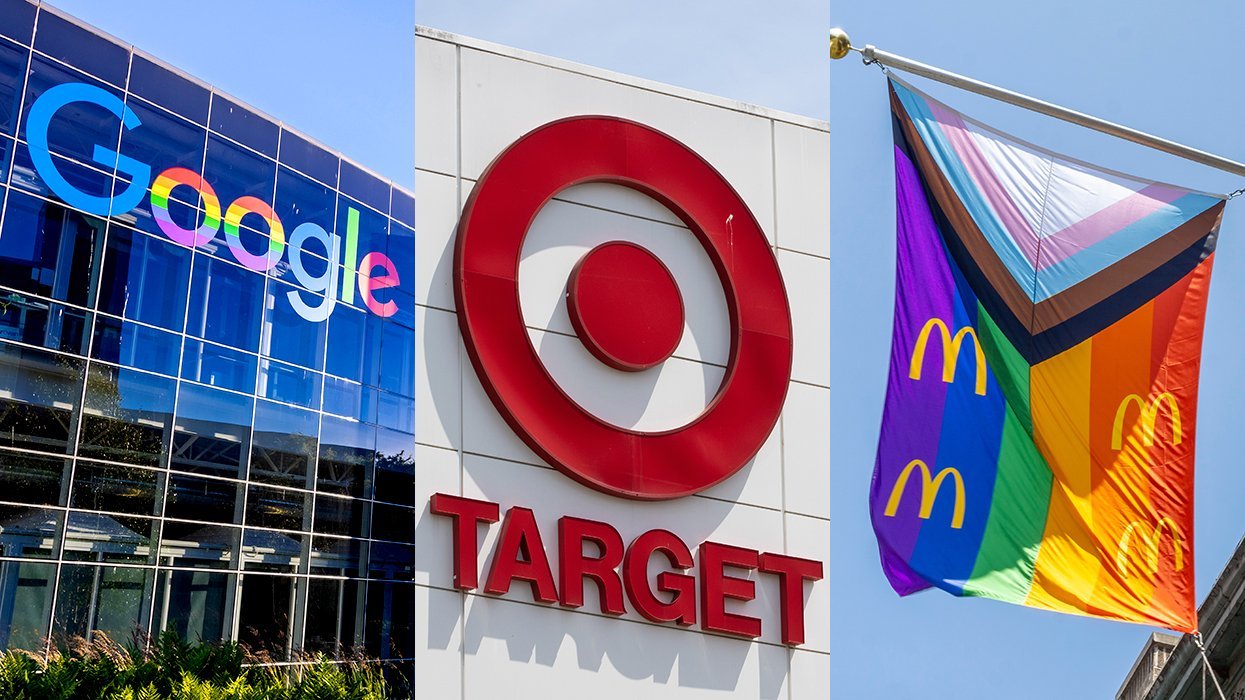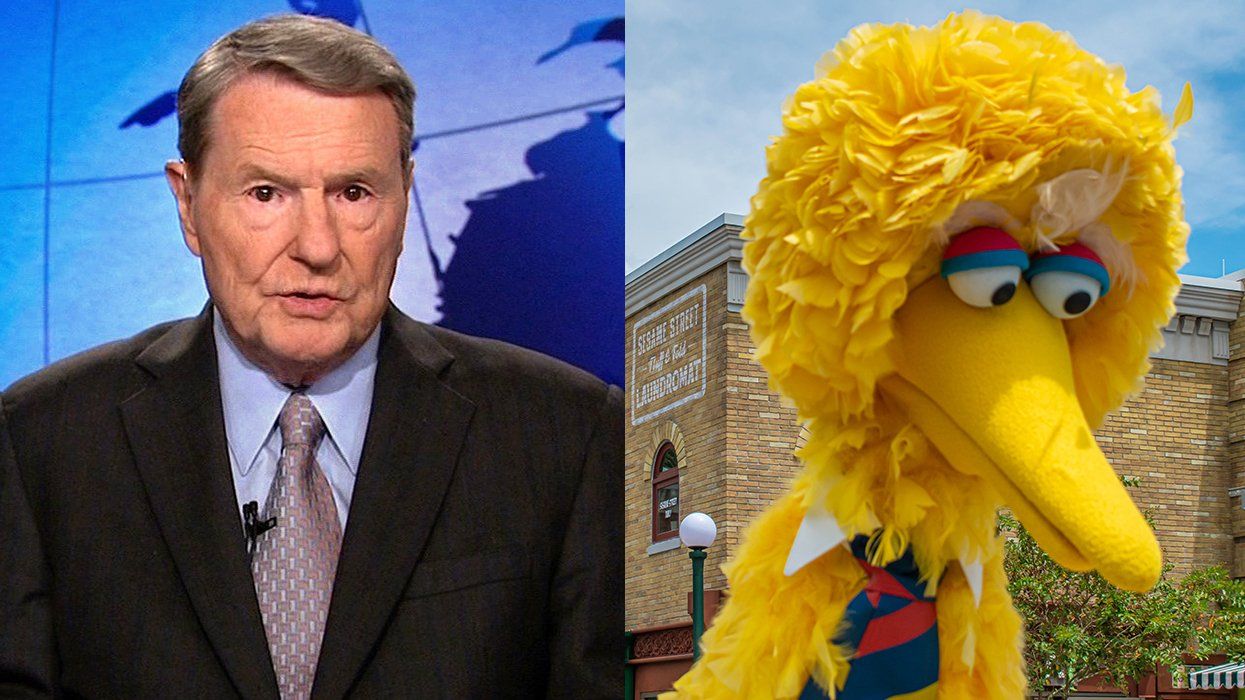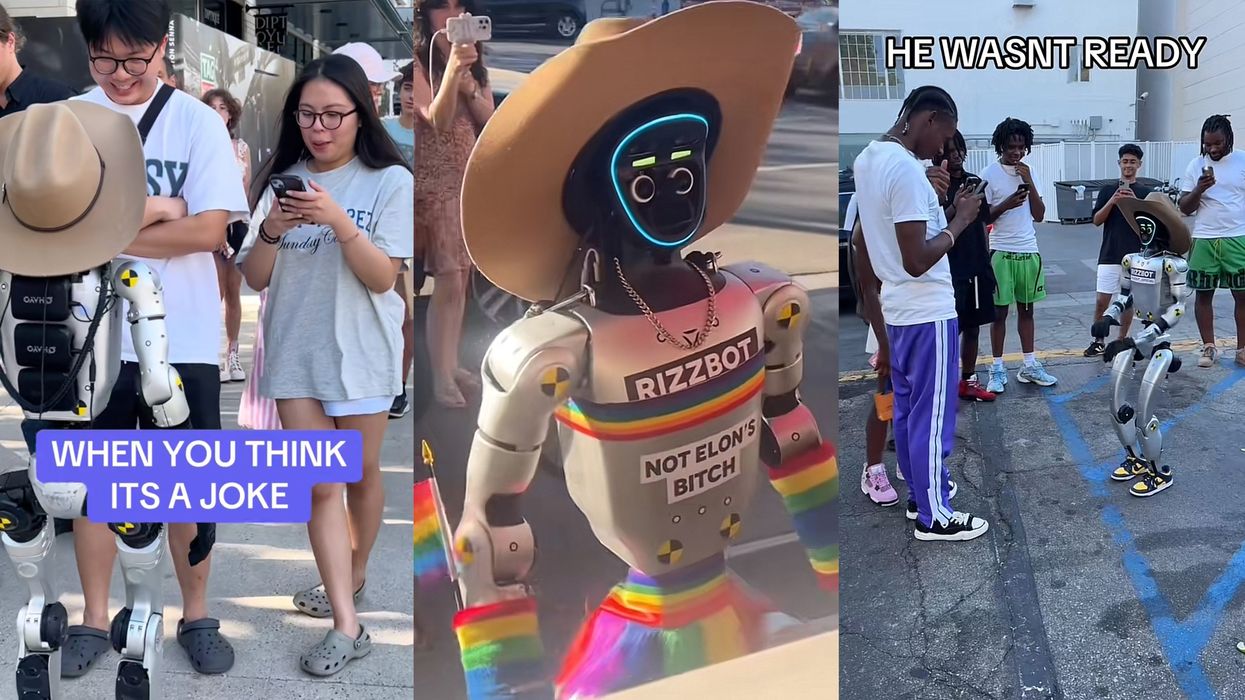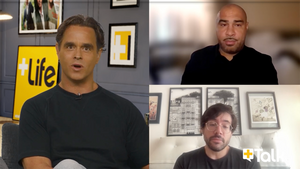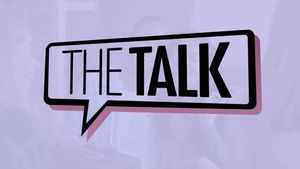In an episode of The Last of Us, Ellie and her girlfriend, Dina, ride horseback through the ruins of what was once Seattle, taking in the city's choice of decor. Rainbow flags and banners saying "Pride" from over two decades ago, when the idea of zombie fungus was the least of their worries. "They must have been happy," Ellie says as they examine all the street accoutrements, having no clue what any of it means. Like a lost language, the queer people in this new dystopian world had lost their history.
I got goosebumps. "This is what I'm talking about," I said as I pointed to the TV as if my husband was missing it all. They were displaying something that we had already experienced as LGBTQ+ folk. The act of diasporic learning. It's something we do with every generation: we grow up, we realize our differences, and we undergo the deep soul-searching of defining our identities. I like to say it's as if we're born in a diaspora, looking for ourselves and for each other.
Like most people, we don't typically come from queer parents who know how to guide us. And in most cases, our parents are learning right alongside us. Staple that together with wavering civil rights that change based on the kind of man we have in the Oval Office, and cultural norms rooted in heterosexual lifestyles. You get a sense of a permanent liminal space where we live, like a Samuel Beckett staging of Waiting for Godot. We meet at a crossroads in life, deciding our next step of autonomous guidance.
So with this ever-changing culture of queerness, what does memory look like? It's a deceptively simple question, because when have we been able to ask it? For many, it carries a particular weight because, historically, we've rarely had the chance to experience it, let alone have the time and space to reflect upon it. Each generation of LGBTQ+ folks has had their statutes of rights, access, traumas, visibility, and none of it has been linear. We all have our singular versions of the queer experience, which makes for a very (if not most) diverse type of people.
In North America, glimmers of queer memory can be traced to Indigenous cultures that recognized Two-Spirit identities and non-binary roles. Additionally, institutions such as the Institute for Sexual Research in Berlin, which existed during the turn of the twentieth century, predated the Third Reich. As with so much of our shared history, colonization disrupted these traditions and lives, erasing many of our narratives from the public record and altering our stories to benefit the victors of the time.
Uncovering queer memory today often requires sifting through archives, special collections, and nonprofit databases. It's a labor-intensive process that asks the researcher to redefine our vocabularies (homosexual instead of queer; cross-dresser instead of trans) as we peel through pages of books and documents to find the threads that connect us to our chosen ancestors. We are still only seeing the lucky few items that were saved or overlooked.
Many reading this would have experienced unprecedented LGBTQ+ visibility in recent years. At no other time in recorded U.S. history have we had such rights and dignities. Just a decade ago, same-sex couples were given the right to marriage, and I count myself as one of those privileged individuals.
We are depicted in ads and on billboards, stroking the superficial wokeness of companies trying to appeal to our wallets. The commodification of queerness has transformed our identities into marketing tools, turning visibility into an opportunity for politicians to use us as scapegoats. Meanwhile, they continue their genocide in Gaza, turn a blind eye to Ukraine, give even more tax cuts to the rich, and the list goes on.
With the current numerous anti-trans bills and anti-LGBTQ+ legislation being introduced and passed in some states, we're experiencing a similar type of hate that other generations have felt many times over before. In 1964, Florida's "Purple Pamphlet" used queer imagery to incite fear nationwide, much like the Nazi regime's infamous degenerative art campaign against modern art and progressive thinking. Did that stop gay people from organizing into the different LGBTQ+ movements of today? Did the modernist movement become dulled by oppression? Though it might feel like a stretch to connect the smear campaign of the early days of modernism to federally funded 'research' of weeding out gays and lesbians in colleges and neighborhoods, oppression doesn't always have to look the same. Like the Mark Twain quote, "history doesn't repeat itself, but it does rhyme."
So, like a rhyme, we must pivot.
Art can lead the way in this endeavor, but I'm biased as an artist. And that's what's so great about it: I get to choose for myself how to push against the powers that be. In Let The Record Show, Sarah Schulman describes the brilliance of the ACT UP movement by focusing on the disparity of actions among its members. One day, a group of Santas could be chaining themselves inside of a Macy's; the next day, a group would be scattering the ashes of loved ones who died of AIDS on the White House lawn.
Not much was overly planned, and there was no cohesive lane of working. And that's what made them so effective. By challenging collective norms, invoking new symbols and actions, we can imagine a queer memory that is as vast and multifaceted as the cultures we seek to honor. It's a kind of queer memory based on our ability to be present and active in our short time on this planet.
A small committee of like-minded New Orleans queer folk took the initiative to replace the UpStairs Lounge plaque last June, which had been stolen in May of the previous year. It was probably snatched up for the bronze plaque's trade-in value (times are tough these days). We were lucky to raise the money for a new plaque due to a wonderful group of allies and generous donors. And if you haven't heard of the UpStairs Lounge fire, that's ok. It's not a story that got much press in 1973 when it was the largest arson in our city's history and, until the Pulse nightclub attack in 2015, the largest gay hate crime to date in the country.
For us in the U.S., having public visibility and historical representation for queer individuals is a significant matter. There aren't many states where you can find AIDS memorials or transgender gardens like those in St. Louis. These public markers are few and far between, but serve as spaces for our chosen offspring to resist the rust of time.
However, this has been my current choice of action. It struck me as something I could take on with what abilities I had to offer at the time. Queer memory is not just about historical visibility and seeing our bodies in the commerce of capitalism—it's about legacy. It's about creating the narratives that can outlast us, something that future generations can look to and take action with. In this moment of unprecedented visibility (and scapegoating), we have the opportunity to craft a memory that is as enduring as it is transformative.
Modernism gave way to a whole array of avenues for navigating this puritanically capitalist world. The queer generations before us have shown us the diversity of paths we can take to stay present, visible, and thrive. Who knows what will happen tomorrow.
But what we must all be asking ourselves is, what are you willing to do today?
Voices is dedicated to featuring a wide range of inspiring personal stories and impactful opinions from the LGBTQ+ community and its allies. Visit Advocate.com/submit to learn more about submission guidelines. Views expressed in Voices stories are those of the guest writers, columnists, and editors, and do not directly represent the views of The Advocate or our parent company, equalpride.






